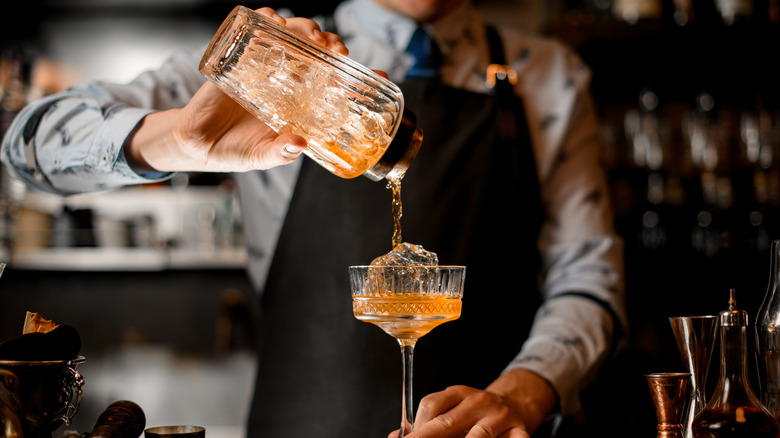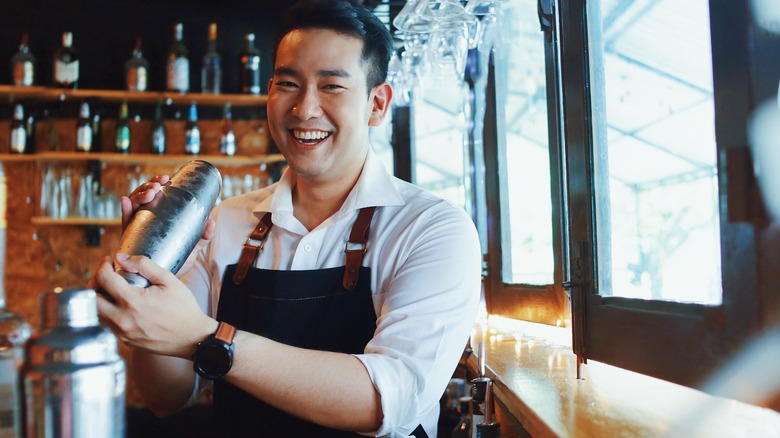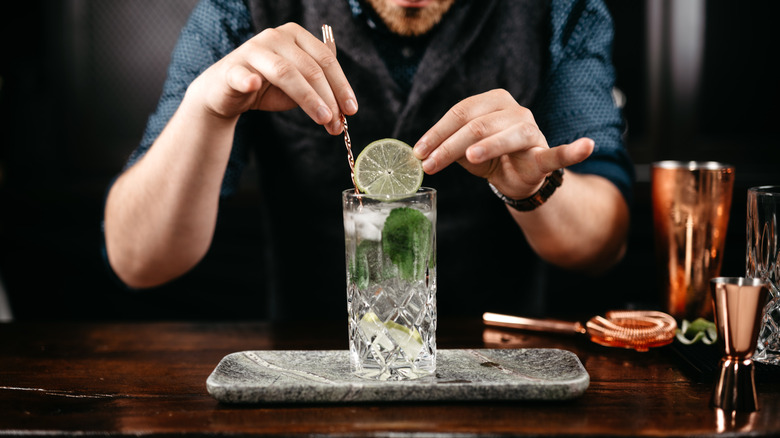The Expertise Difference Between Mixologists And Bartenders
If you're one of the many people who like to spend their weekend checking out the latest hot new cocktail bar with friends, then you're no doubt familiar with the role of the bartender. (With over 72,000 bars and nightclubs in the U.S., per IBIS World, why wouldn't you want to try out a few?) Expertly crafting drinks for a crowd of people, unfazed by the chaos that is a bar on a Friday night, bartenders run the show of the nightlife scene — and they're very much in demand. The field is expected to grow by 18% in the next decade alone, per the U.S. Bureau of Labor Statistics.
While many of us can appreciate the career path of a bartender, a role that takes months or even years of practice to obtain, some of us might not be as familiar with its sister role of a mixologist. If you're one of the people under the impression that a mixologist is just a fancier word for a bartender, you're not alone, but that's simply just not the case. The two roles are actually completely different, and the biggest distinction between them lies in the mastery level.
What does it take to be a bartender?
According to ServingAlcohol.com, every state's laws are different, but many establishments have some requirements for their bartenders. Step one for many barkeeps is taking a course to learn the basics of drink making and obtaining a bartending license. While not every bar or restaurant requires you to take these classes, it certainly helps to get hired, and many bartenders opt to earn one, per Bols Cocktails. The time commitment for these classes varies, but most take between a few hours to a few weeks, via National Bartending School.
After those drink-making courses, aspiring bartenders can further their careers with simple practice. The world of drinks is a vast one, and you're not gonna learn it all overnight. According to Local Bartending School, many bartenders take a few months to get to know the most popular cocktails sold at their bar before diving deeper into the less common concoctions. Taking some time to get comfortable behind the bar and honing those drink-making skills is an important part of the process. Per The Nimble Bar Co, bartenders also do a number of things beyond drink making like setting up the bar, taking orders, dealing with payments, cleaning and replenishing ingredients, and much more, so it all takes some time and patience to master. But how does mixology differ?
Mixologist v. Bartender: what's the difference?
While some may think the terms bartender and mixologist are interchangeable, they're actually two different titles. According to MasterClass, while bartenders work in front of house to keep thirsty patrons happy, a mixologist typically works on the back end of things. That's due to the difference in expertise between these two roles. As a bartender from NYC's Gordon Bar explained, "a mixologist is more like a chef in that they spend a lot of time researching ingredients and comparing flavor profiles," via Mental Floss. That's why mixologists often choose to work behind the scenes crafting unique cocktail menus for restaurants, while bartenders are there to pour out the creative mixes for the crowds, per MasterClass.
According to Demitri's All Natural Gourmet Mixes, there's not yet a formal education to become a mixologist, so those that want to become one can start by taking a deeper look at the science behind cocktail making after going through the usual bartending training. (This is why some bartenders consider themselves mixologists, but not every bartender is one.) With that extra studying on ingredient chemistry, spirit history, and all else there is to know about drink making, you're on your way.


